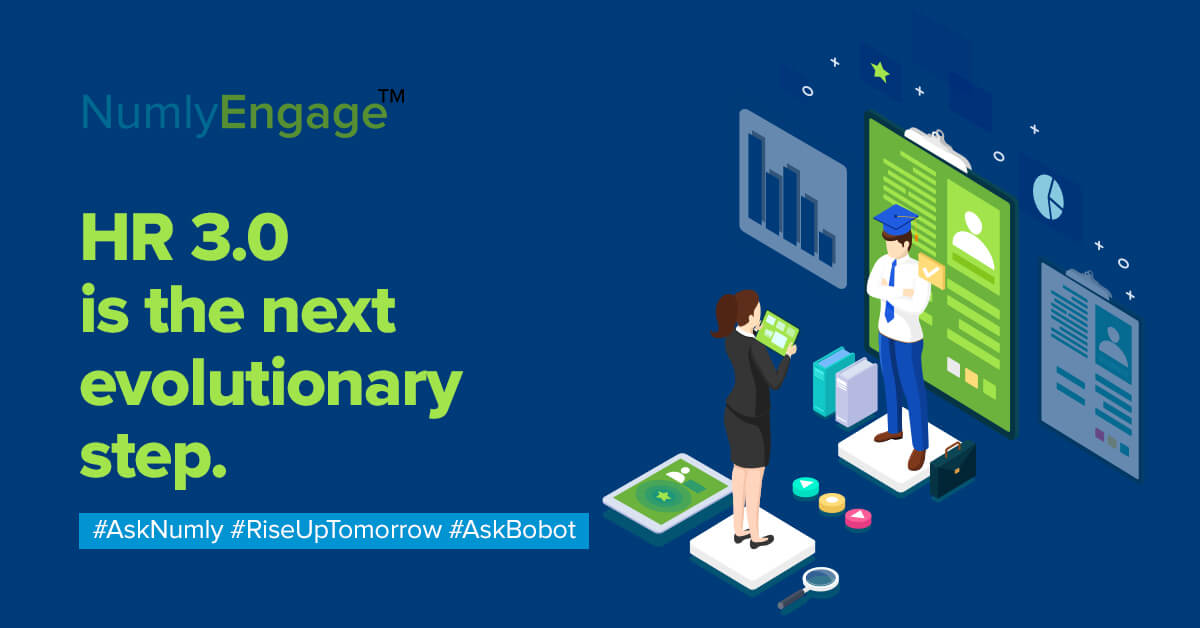Human Resources (HR) is at an inflection point. From an administrative and industrial relations function of the 1980s known as HR 1.0, HR has been in a state of constant evolution. In the 1990’s we witnessed organizations becoming more aware of the value of talent and the subsequent transformation of HR to the role of a business partner with a focus on analytics and reporting (HR 2.0).
However, as the world of talent continues to become more complex, and organizational growth and profitability become directly tied to the capacity to innovate and collaborate, HR has to grow and become a strategic advisor.
With this evolution comes the dawn of HR 3.0.
Why HR 3.0?
Compliance, administration design, programs, and jobs were the focus of HR 1.0.
Process excellence, standardization, self-service, shared services were the focus of HR 2.0.
Cognitive, personalized, transparent, and elevated employee experience and talent performance management are the focus areas of HR 3.0.
Given that the business environment today is enveloped in a state of constant flux and disruption, it becomes inevitable for organizations to look at a new HR model that focuses on driving value from talent. For this, HR has to become more agile and allow the voice of the employees and managers to permeate and integrate throughout HR and not remain cloistered in silos. For that, HR 3.0 demands that HR becomes an integrated business function that brings together the expertise of all other business functions.
With millennials making up 75% of the global workforce and the rise of the digital workplace, the move towards HR 3.0 is not just necessary but is inevitable. This generation at work demands HR to step up and move to the next level by becoming analytically sophisticated and with fewer swim lanes and even fewer silos that stand between providing elevated employee experiences and improved talent performance management.
The COVID 19 pandemic has further fuelled the move towards HR 3.0 by bringing in new working models, increasing disruption, and accelerating digital transformation. As employees adjust to this new normal, it is but natural for them to expect more from their organizations – especially as remote working and the subsequent burnout become more pronounced.
Employee experience and talent performance management – the two critical pillars of HR 3.0
Employee experience and talent management are central to HR 3.0 since these areas influence an organization’s overall enterprise transformation. With accelerating digital reinvention, organizations have to understand the needs of the employees better, improve talent performance management, and discover avenues to identify and address employee concerns proactively.
HR departments, therefore, need to
- Adopt a personalized, experience-centric design
- Place skills, and, consequently, skills development, at the core of the enterprise
- Enable data-driven decision-making leveraging technologies such as AI
- Increase speed and responsiveness by adopting agile practices
- Improve transparency to preserve trust and build loyalty
Clearly, data lies in the heart of HR 3.0 and helps organizations measure, develop, engage, and consequently transform the workforce.
Driving employee experience and talent performance management in the age of HR 3.0
Organizations have to focus on improving employee engagement and performance by building people connections, improving internal coaching, and accelerating skills development to display their investment in their workforce.
However, to achieve this, they need to create an experience-centric design around employee performance and the consequent organizational development plan by delivering value-added experiences that are contextual and relevant.
Creating an experience-centric design around employee performance and talent performance management involves employing experiential learning platforms that extend eLearning and Blended Learning with people coaching (both hard and soft skills), diversity, equity and inclusion programs, and core value engagement programs.
Some of the key focus areas to enable this are:
- Employing AI-driven HR coaching platforms to connect the right coach with the right mentee and facilitate continuous, data-driven feedback, and deliver timely and relevant nudges to facilitate learning and growth.
- Applying in-built surveys and assessment tests to identify roles based on coaching needs and define skill-based coach-learner pairings to ensure clear and continuous coaching. This becomes essential as knowledge sharing and skill development become central to employee experience.
- Ascertaining employee skill strengths and weaknesses with 16 Personality Factor assessment and program surveys instead of the proverbial gut-feel. Additionally, organizations have to enable administrators and program managers to create, personalize, and update surveys associated with different coaching programs.
- Using surveys and assessment dashboards to gain comprehensive insights into high-potential employees, their strengths, and areas of improvement to develop comprehensive development plans and healthy leadership pipelines.
- Utilizing pre-packaged, easy to set up, hybrid, customizable templates to enable skills development for the key enterprise functions.
- Gaining awareness and visibility to skill data to develop and customize skill development plans proactively. Organizations also have to proactively fine-tune learning and development investments based on actual skill gap measurement. This data also helps in identifying top talent and measuring bench strength across critical skill areas.
- Developing contextual and relevant coaching and reskilling/upskilling programs by gaining clarity on employee personality factors.
Taking a data-driven approach to improve employee experience and talent performance management makes it proactive, rather than reactive. It also allows organizations to deliver deeply personalized experiences across employee journeys and facilities better coaching conversations.
The idea that performance management = performance review no longer works.
The shift of focus from employee engagement to employee experience has happened.
As organizations and HR outgrow these old models because of changing work dynamics, organizations have to enable HR departments with new tools to deal with new challenges.
With the right tools and technologies at their disposal, HR can measure and manage employee journeys and create the right experiences that drive performance and innovation, and ultimately, profitability.
Contact us to know how you can benefit from NumlyEngage™

